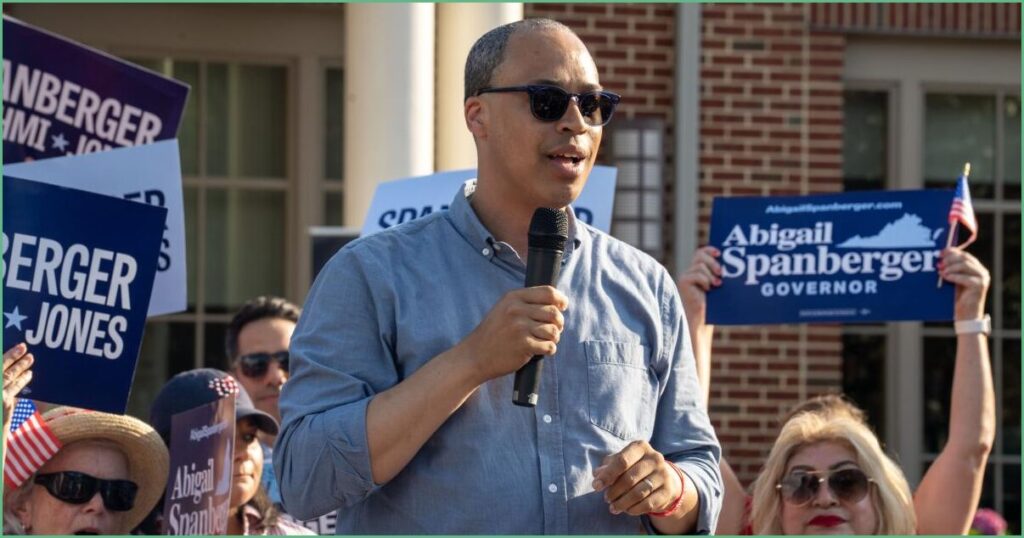Virginia police union calls on Democrat candidate for AG to resign over sending violent texts
Virginia voters are watching a simple test of accountability play out after a string of violent text messages from a Democratic attorney general candidate resurfaced. The Virginia Fraternal Order of Police has publicly urged the candidate to withdraw, arguing that someone who would send such messages should not be the state’s top prosecutor. For Republicans and many independents, this is less about politics and more about whether character is disqualifying for law enforcement leadership.
The messages in question date back to 2022 and were directed at Virginia Delegate Carrie Coyner. Among the lines read exactly: “Three people, two bullets. Gilbert, Hitler and Pol Pot. Gilbert gets two bullets to the head.” That language is shocking on its face and impossible to dismiss as mere political heat.
Those texts also reportedly included wishes of harm toward the family of Republican House Speaker Todd Gilbert, which raises obvious questions about temperament and judgment. A prosecutor wields the state’s power to charge and pursue people, so threats or fantasies about violence undermine public confidence. Voters deserve someone whose instincts are toward enforcing the law, not fantasizing about breaking it.
Why this matters for voters and for public safety
When the organization that represents rank-and-file officers says a candidate is unfit, their view can’t be waved away as partisan noise. The FOP letter was blunt: “While this incident may have occurred in 2022, this conduct has no place in our society or democracy, especially from an elected official who is running to be the top prosecutor in Virginia,” the FOP wrote. “The men and women of the Virginia Fraternal Order unequivocally condemn these violent text messages sent by you about a political opponent and his family.”
The FOP did not stop there, and their next line underscored the stakes: “Therefore, the members of the Virginia Fraternal Order of Police believe that you, Jay Jones, are unfit for the office of Attorney General of Virginia. It is time you hold yourself accountable for these actions and withdraw from the Attorney General race immediately.” That is a call for withdrawal, not mere criticism.
Republicans argue this is a clear matter of fitness and trust. If someone running for the office that directs criminal enforcement can write violent fantasies about political rivals, how will they handle real-world prosecutorial discretion? That question matters in every community when prosecutors decide whether to charge, plea bargain, or seek harsh sentences.
Jay Jones has issued an apology, saying he takes responsibility and expressing regret. He stated: “Reading back those words made me sick to my stomach. I am embarrassed, ashamed, and sorry.” Public apologies matter, but in politics and prosecution they only go so far when the underlying conduct suggests a pattern of alarming rhetoric.
Republican leaders and conservative commentators have seized on the episode to point out a broader theme: public officials must be held to a standard that matches the power they seek. This is not cynicism for its own sake; it is a demand for consistency. If the left argues for higher standards for the other side, those standards should apply at home too.
There is also a practical enforcement angle. The attorney general’s office handles sensitive investigations and decisions that affect everyday safety. Entrusting that office to someone who once penned violent threats—even in private messages—creates a credibility gap with law enforcement partners and the public. Prosecutors need cooperation from police and communities to do their jobs, and that cooperation depends on mutual trust.
Some defenders say political opponents will always dig up old messages and try to end campaigns over regrettable comments. Voters should weigh that reality against the specifics here: the text is explicit and violent, and the target was a fellow elected official and his family. Regret can be real, but it does not erase the question of whether a candidate’s judgment one day could endanger civil liberties or public safety another day.
Accountability in a free society means consequences for actions that undermine trust in institutions. The FOP’s demand for withdrawal frames this as a common-sense standard: those who seek to enforce the law must exemplify restraint and respect for human life. If the candidate cannot meet that bar, then stepping aside allows the race to be about policies and leadership rather than character doubts.
Democrats will decide how to handle the internal fallout, and voters will decide who they trust to be a fair, steady hand when wielding prosecutorial power. For Republicans, this is an opportunity to press a basic point: character matters, and the consequences for violating that trust should be clear. The question now is whether accountability will follow the spotlight.
Ultimately this episode will test whether political parties prioritize public trust over short-term electoral advantage. Virginians deserve an attorney general who inspires confidence from both law enforcement and the broader public, not one who leaves a cloud of violent rhetoric hanging over the office. The decision about withdrawal, or continued candidacy, will tell voters a lot about priorities and principles heading into the ballot box.
n
h/t: Just The News
n
